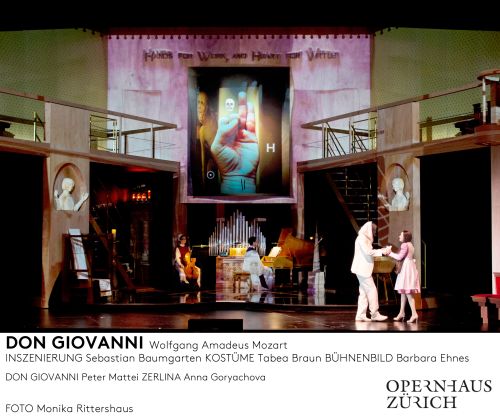 Switzerland Mozart: Don Giovanni: Soloists,Chorus of the Zurich Opera, Orchestra La Scintilla Zurich, conducted by Robin Ticciati, Zurich Opera, Zurich. 26.5.2013. (JR)
Switzerland Mozart: Don Giovanni: Soloists,Chorus of the Zurich Opera, Orchestra La Scintilla Zurich, conducted by Robin Ticciati, Zurich Opera, Zurich. 26.5.2013. (JR)
Cast:
Don Giovanni Peter Mattei
Donna Anna Marina Rebeka
Don Ottavio Pavol Breslik
Komtur Rafal Siwek
Donna Elvira Julia Kleiter
Leporello Ruben Drole
Zerlina Anna Goryachova
Masetto Erik Anstine
Production: Sebastian Baumgarten
Sets: Barbara Ehnes
Costumes: Tabea Braun
Lighting: Franck Evin
Video-Design: Chris Kondek
Choreography: Denise Lampart
Chorus Master: Jürg Hämmerli
Dramaturgy: Werner Hintze

Upon the appearance of the production team after the final curtain, the cheers (just) outnumbered the boos. This new production, by Sebastian Baumgarten, left the audience very much divided.
As the audience enters the auditorium to take their seats, they are prepared to some extent for what is to come. Industrial workers in pink paint-spraying protective gear, with white wellington boots, are painting banners with religious motifs, such as “Fürchtet Gott, denn die Stunde seines Gerichts ist gekommen” (Fear God for the moment of his judgment is nigh); apt, of course, for this opera. Only when the curtain rises, do we see the related aspects of Herr Baumgarten’s vision for this opera. The workers turn out to be members of a Christian sect, with long beards and the typical dress and headgear of the Amish. Don Giovanni is the cult leader of their sect, dressed in Act I all in white. The scene is set in a ritual room of a convent, at the back next to the font and some illuminated angels a cleric plays the harpsichord accompaniment to the recitatives, eerily modernised for this modern production. At the front a short curved wall with openings for doors and windows serves to indicate that the inmates of the convent (including the audience) are watching a morality play. Don Giovanni appears in a gorilla suit carrying Donna Anna ready for rehearsals in King Kong.
At the back is a video screen, depicting Don Giovanni’s conquests (a bottom being spanked) and the Seven Deadly Sins as the opera progresses. At the front, a veil descends from time to time with video images of Don Giovanni pulling funny faces. It is all over-produced; there are simply too many elements to assimilate. The masked ball descends into a Ku Klux Klan ritual sacrificing of a young virgin, in this instance Zerlina. Blood spurts from her abdomen. There are some spectacular crocheted multi-coloured costumes for the band. Then follows some fairly explicit Marquis de Sade-style bondage. Don Giovanni, by now dressed all in black, has sex with Zerlina in a bath, luckily the naked bodies are only shown on film. You get the flavour.
By the last Act, Don Giovanni is dressed in red pyjamas, with the Devil’s horns. Or was it a re-appearance of Jimmy Savile? The names of the men most famous for their libertine sexuality (including the Marquis de Sade and Casanova) are shown on the video screen and deleted one by one, until it is Don Giovani’s turn. After the banquet scene goes up in some fairly spectacular flames, with flashing theatre lights around the proscenium arch, the video screen at the back depicts Don Giovanni taking the lift down into the flames of Hell. Members of his sect enter impassively, looking strangely like Oompa Loompas.

Traditionalists were enraged; some singers were visibly shocked by the level of booing. Modernists were delighted. The production certainly made evident that sexual shenanigans of all sorts are alive and well today.
Vocally, more happily to report, the singers formed a fine ensemble. Top honours, for me, go without hesitation to Marina Rebeka, a Latvian singer, singing for the first time in Zurich; no surprise to read she has already sung the role in Berlin in 2010 and then for James Levine at the Met. She will sing Donna Anna again in Chicago and Vienna.
Julia Kleiter sang a sturdy and impressive Donna Elvira, and young Russian soprano Anna Goryachova charmed with a delightful and strongly sung Zerlina.
Ruben Drole, true to his name, clearly likes playing the comic parts and his Leporello gave him the chance to show off his mellow bass, acting and acrobatic talents. Pavol Breslik is now becoming the leading tenor at Zurich’s opera house, now that Jonas Kaufmann has moved on and up. Breslik’s voice is firm and secure, his Don Ottavio most accomplished. Rafal Siwek, a Polish bass, sang the Commendatore with just the right degree of chill.
Peter Mattei’s Don Giovanni was disappointing in the main. He has so much action to handle in the production that he can hardly catch his breath for the music. Only when allowed to sit and woo Zerlina, did one marvel at his voice, especially when singing pianissimo. The accompanying mandolin player almost stole the show at that point.
Robin Ticciati in the pit looks and conducts like a young Sir Colin Davis, even down to the soft black shoes and the way he holds the baton. There is also more than a passing resemblance to the young Simon Rattle. He too received a number of boos but I suspect (hope) that referred to the sound (rather than the playing) of the opera house’s period orchestra, La Scintilla, which occasionally sounded weedy; authenticke instruments and scaled-down orchestras are not to everyone’s taste. Ticciati tried his hardest to inject some dramatic urge into his players, and in the later part of the opera succeeded. But after a week of listening to almost non-stop Wagner, as composer of the week on Radio 3, I too must admit that I yearned for a fuller sound and some more gripping music.
John Rhodes